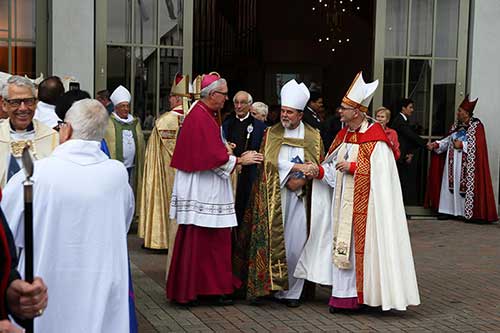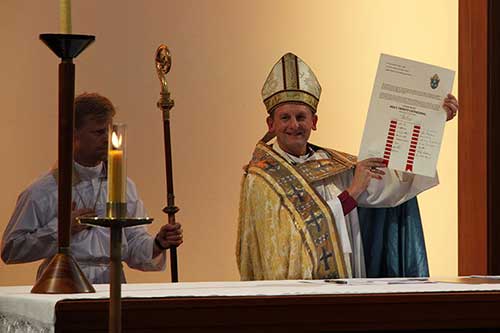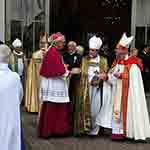
I had a fascinating discussion recently with someone I deeply respect who kept pressing me to deeper clarification about what actually happens at baptism. What difference does it actually make?
I have this conversation in mind with the news of the consecration of Auckland’s Holy Trinity Anglican Cathedral.
What actually happens when a church building is consecrated? What difference does it actually make?
Let me be absolutely clear for the skim readers: in this post, I am in no way suggesting that we stop consecrating buildings, just as my friend was in no way suggesting that we stop baptising. Congratulations to everyone involved in the Auckland occasion. By all accounts, it was a wonderful occasion.
Secondly, for the skim readers: questions in this post are not rhetorical.
Is there any mention of consecration of buildings in our NZ Anglican canons?
My own diocese does include rules on CONSECRATION OF CHURCHES
(a) No Church will be consecrated while any debt on the building remains unpaid.
(b) No Church will be consecrated unless it is a permanent building.
(c) A clear title to the land must be held by The Church Property Trustees.
(d) Churches that do not fulfil the above conditions may be opened with a service of Dedication.
(e) A petition for the Consecration, signed by the Vicar and Church Officers and, if desired, by other Church members, will re required.
(f) The form of petition will be drawn up by the Diocesan Manager, on application accompanied by such statements relating to the above particulars as the Bishop may require.
But, at a quick look at some other NZ Anglican diocesan websites, I cannot see rules for consecration there. Let us know if you know of them.
Setting aside that in my quote above consecration appears to be limited to parish buildings (ie. places with a vicar), there is a distinction in the rules between “dedication” and “consecration”. What is the actual difference between “dedication” and “consecration”?
The cathedral in Christchurch has been dedicated, not consecrated. What is the actual difference? [The cathedral in Christchurch is a permanent building and, as far as I know, paid off. Yes – it doesn’t have a vicar…]
I don’t think there is an agreed (Anglican) rite of consecration, or of dedication. So there is nothing “formal” that we can examine.
“Consecration” is mentioned in our formularies (formal teachings and practices of our Church) – the Book of Common Prayer (1662) calls the prayer over the bread and wine in Holy Communion “The Consecration”. And in the Ordinal that goes with that, while deacons and priests are ordained, bishops are “Ordained and Consecrated”.
In the New Zealand Prayer Book He Karakia Mihinare o Aotearoa, the service for all three (deacons, priests, bishops) are all called ordinations. And all three are ordained by a “prayer of consecration”.
As far as I know, even though we now talk about bishops being ordained (rather than consecrated), I think bishops still produce documents signed “in the …. year of my consecration”. [If they are translated from one diocese to another, do they date it from when they were ordained a bishop, or from when they were translated to be bishop of the place where they now oversee?]
There is a (Anglican) tradition that the building to be consecrated needs to be complete. Am I correct about that tradition? Is it in any documentation? It is not mentioned in the quote above, and clearly not integral to the Christian tradition of consecration of buildings as evidenced by the consecration of the Sagrada Familia (that whole post is worth a read).
To be continued…

photos source Anglican Taonga
If you appreciated this post, do remember to like the liturgy facebook page, use the RSS feed, and sign up for a not-very-often email, …




Hi Bosco,
Dedication is to skim, consecration is to have dung deeper for the whole (holy) maybe…
Ruth
To answer your aside, the C of E convention is to give both: “in the Xth year of our consecration and Yth of our translation” (and to read them aloud at institutions, installations, licensings, &c., so I’ve heard quite a few!)
I haven’t paid attention to this, Chris. I know someone who should know for here, and I will contact that person for the tradition in NZ. Blessings.
I must admit that I was surprised that a Cathedral, whose first part was built in the 1950’s, was only now being consecrated. Completing the full construction and paying of the debt seems to have been required.
A friend centrally involved in the consecration remarked that the process was much more straightforward in the Catholic Church, where there are clear rules and processes for most things.
The sacramental sign seemed to have been the annointing of the consecration marker stone with chrism oil, but I’m not sure Anglicans have as developed a theology of sacramentals, or of consecration, as Catholics do. But we’d be pretty comfortable with the idea of dedication and consecration as being rather similar, with consecration being regarded as more significant and occuring under a clearer sacramental sign.
Many Blessings
Thanks, Chris.
I’m taking from your comment that you are referring to the Auckland event (rather than the RC practice) when you write, “The sacramental sign seemed to have been the annointing of the consecration marker stone with chrism oil”. I’m happy to be corrected, but I suggest “the annointing of the consecration marker stone” is “made up” and that other bishops would use a quite different sacramental.
Even “chrism” will vary from place to place. There is no NZ Anglican agreement on different oils. I know at least one bishop in our province, for example, who uses oil in ordination – I would be interested how widespread that is.
What I’m suggesting in my post is that what people like spreads (akin to our previous conversation).
I’ve seen (Anglican) arguments that it is the walls of the building that are consecrated (as if the roof doesn’t count). Again, as you suggest, RC positions are “much more straightforward”.
Blessings.
Regarding your question about bishops and translation: documents here in Melbourne are signed with both, ie “in the nth year of our consecration and the nth year of our translation”.
Thought-provoking. Without dipping into the theology of consecration/dedication, a comment from one who was a Royal Navy chaplain for some years: Ministry of Defense churches and chapels are not consecrated but dedicated – in order that their usage can be changed in times of war, crisis or emergency.
This is very useful information, Tim. People change the usage of consecrated buildings also. Your point adds a helpful thread to the discussion. Blessings.
The hallowing of a place of worship imitates the Christian initiation of a person. The altar is first washed, then is chrism put on. Thirdly, the Eucharist is celebrated. When a place of worship is consecrated, it is definitively put aside for the only purpose of worship.
But in some countries (as Belgium), the Christian initiation is legally forbidden, for children who have two parents, but when one of them doesn’t formally agree. What can you do then? A churchly dedication of the child, and when the child is major, s/he will maybe undergo the Christian initiation.
Therefore, just dedicating a place of worship, without consecrating it, seems reasonable, if there be the risk that the building be one day turned into a thing of secular purpose.
Thanks, George. I think your points include some of what will also come up in the next post on this. Blessings.
‘No Church will be consecrated while any debt on the building remains unpaid.’
I wonder how many ‘consecrated’ churches we’d have in the US then?!
Two comments, Bosco.
1/ Your post led me to the very rare step of looking up my Deacon’t ordination certificate. Paul Reeves ordained me in 1984, which was the
“fourteenth year of our Consecration,
the sixth year of our Translation,
and the fifth year of our Primacy.”
2/ Whatever we think actually happens at the Consecration of a building, the recent experience of your diocese in the aftermath of the earthquakes shows that the perpetual setting apart of the building for worship still remains somewhat conditional. +Victoria has had to conduct some dozens of “De-consecration” ceremonies prior to demolition and/or reconstruction. I guess that if we continue your analogy with the consecration of a bishop, it is theoretically possible to De-consecrate one if they are sufficiently naughty.
Thanks, Edward.
I have received “behind the scenes” information that there is in our province no consistency to including translation or not in a licence. The concept of deconsecration is in my mind for a future post on this 🙂
Blessings.